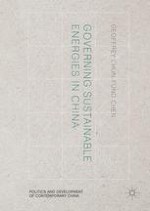
2016 | OriginalPaper | Buchkapitel
1. How States Build Sustainable Energy Capacity
verfasst von : Geoffrey Chun-fung Chen
Erschienen in: Governing Sustainable Energies in China
Aktivieren Sie unsere intelligente Suche, um passende Fachinhalte oder Patente zu finden.
Wählen Sie Textabschnitte aus um mit Künstlicher Intelligenz passenden Patente zu finden. powered by
Markieren Sie Textabschnitte, um KI-gestützt weitere passende Inhalte zu finden. powered by